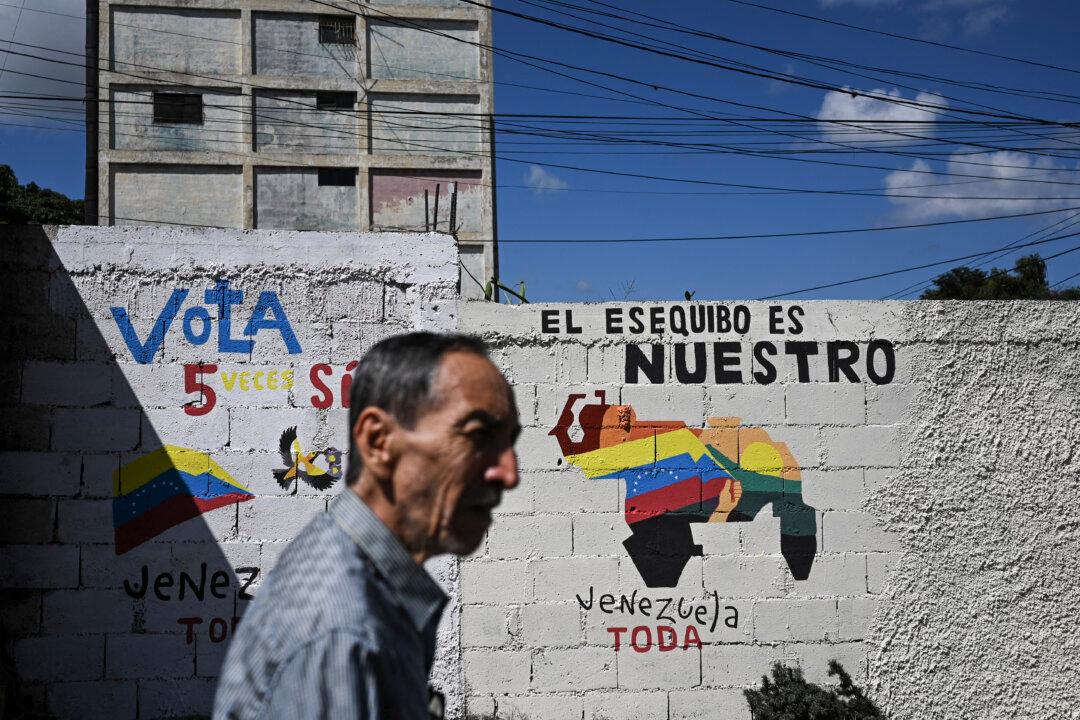Commentary
Venezuela is all but threatening Guyana—its smaller pro-U.S. southern neighbor—with an invasion.
On Nov. 20, Venezuelan leader Nicolás Maduro announced a “people’s vote” to “respond to the provocations of Exxon, the U.S. Southern Command, and the president of Guyana” by deciding on whether to annex the Essequibo region, which includes almost 75 percent of the country’s territory and 200,000 Guyanese. The area has most of the country’s oil reserves—the largest globally per capita. Few Essequibo residents speak Spanish, the language of Venezuela, or have significant relations with the country. Most speak English and indigenous languages.
While the International Court of Justice sensibly ruled against any Venezuelan invasion of Guyana on Dec. 1, it, unfortunately, didn’t take a position against the vote, which will almost certainly pass and stakes Mr. Maduro’s reputation on following through.
Mr. Maduro’s election in 2018 was a fraud, and his current approval rating is just 20 percent. The unpopular dictator is unlikely to be elected in the 2024 election without dirty tricks. This vote to invade a neighbor is his authoritarian form of electoral jujitsu.
The most popular candidate is María Corina Machado, who’s pro-democracy, pro-market, has a positive approach to the United States, and has supported foreign military intervention against the Venezuelan regime.
That should be a serious policy option under consideration by the Biden administration before Mr. Maduro destabilizes South America further. A U.S. Army delegation visited Guyana in late November to discuss military readiness and security threats, which is a step in the right direction.
If the United States does defend Guyana, perhaps the Guyanese people would be so kind as to pay the bill with their newfound oil wealth. At more than $33 trillion in debt, the United States is a bit tight at the moment.
Mr. Maduro is responsible if a war results. Instead of going through a normal electoral process, his regime invalidated Ms. Machado’s candidacy.
“Maduro needs to mobilize party loyalists to defend two decades of socialist rule during which his party and its predecessors have turned Caracas into an international pariah, shattered its state-run oil industry, fueled mass emigration, and empowered violent gangs,” the Financial Times stated.
Mr. Maduro is an ally of Russia. He sells much of his oil—which, until October, was sanctioned by the United States—to China. The sanctions were imposed by the Trump administration in 2019 in a failed attempt to oust Mr. Maduro in favor of a pro-U.S. leader of the National Assembly, Juan Guaidó.
Mr. Guaidó, who established a government-in-exile with the help of the Trump administration, is now on the lam from Venezuelan law and living in the United States.
The Biden administration temporarily lifted the sanctions to decrease energy inflation and illegal immigration. Their continued removal was conditioned on fair elections and the freeing of hostages and political prisoners.
But Caracas broke the agreement by invalidating the opposition’s primary choice and not releasing the country’s political prisoners and hostages. Within days of the U.S. sanctions relief, Venezuela allegedly took into custody another American hostage, Savoi Wright. The regime filed no criminal charges and didn’t give Mr. Wright access to a lawyer. His family says the ransom demand is tens of thousands of dollars.
In addition to having a government of apparent criminals, Venezuela is a haven for terrorists, drug smugglers, and money laundering, according to the U.S. Government Accountability Office.
Allowing Mr. Maduro to stay in power after all that he did would be a travesty. Allowing him to do so by hyping nationalist sentiment in favor of violence against a neighboring country should be unthinkable. Allowing him to actually carry through and invade, causing untold deaths just 1,800 miles from Miami, should be a crime.
Already, Brazil is mobilizing its military to intervene near the borders of Venezuela and Guyana, which could spread war to a much larger scale. It would destabilize all of South America, buttress the strength of Mr. Maduro because of the rally-around-the-flag effect, and encourage other would-be aggressors globally to resort to violence as their poll numbers drop.
That would feed a steady stream of new pariah states into the arms of Xi Jinping in China. Something similar has already happened in Russia, Iran, and Burma (Myanmar). When states invade countries, sponsor terrorism, or execute genocides, they get sanctioned by the West. But their trade with China remains unsanctioned. That turns them into dependent vassals of the Chinese Communist Party (CCP).
Failure of the world’s law-abiding democracies to impose sanctions on not only their own trade with rogue states but also on trade between rogue states is creating a politically polarized world, with the most powerful pole being Beijing. It plays into the tactics and strategic goals of the CCP, which are apparently to encourage states to act in criminal ways, get them sanctioned by the West, and then welcome them into the CCP’s merry band of thieves.





